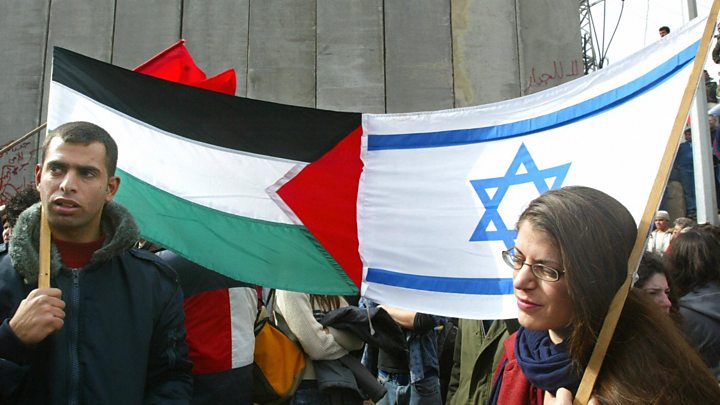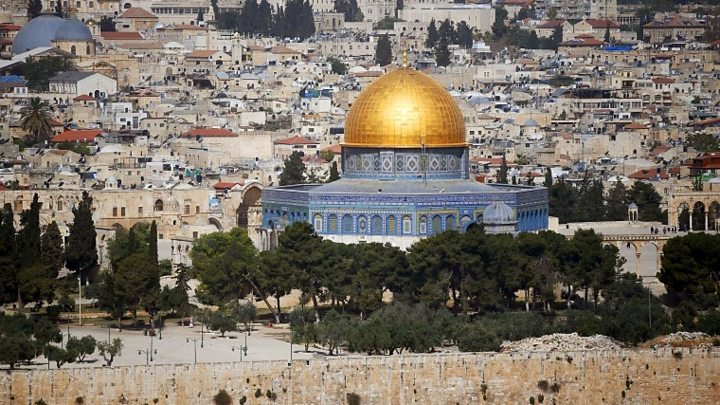Media playback is unsupported on your device
US President Donald Trump has presented his long-awaited Middle East peace plan, promising to keep Jerusalem as Israel's undivided capital.
He proposed an independent Palestinian state and the recognition of Israeli sovereignty over West Bank settlements.
Standing alongside Israeli PM Benjamin Netanyahu at the White House, Mr Trump said his proposals "could be the last opportunity" for Palestinians.
Palestinian President Mahmoud Abbas dismissed the plans as a "conspiracy".
"I say to Trump and Netanyahu: Jerusalem is not for sale, all our rights are not for sale and are not for bargain. And your deal, the conspiracy, will not pass," he said in a televised address from Ramallah in the West Bank.
The blueprint, which aims to solve one of the world's longest-running conflicts, was drafted under the stewardship of President Trump's son-in-law Jared Kushner.
Thousands of Palestinians protested in the Gaza Strip earlier on Tuesday, while the Israeli military deployed reinforcements in the occupied West Bank.
Media playback is unsupported on your device
The joint announcement came as both Mr Trump and Mr Netanyahu faced political challenges at home. Mr Trump is the subject of an impeachment trial in the US Senate while the Israeli PM on Tuesday dropped his bid for immunity on corruption charges. Both men deny any wrongdoing.
David Friedman, the US ambassador to Israel, said that the timing of the announcement was not tied to any political development, adding it had been "fully baked" for some time.
What are Trump's key proposals?
"Today, Israel takes a big step towards peace," Mr Trump told officials and reporters at the White House.
"My vision presents a win-win opportunity for both sides, a realistic two-state solution that resolves the risk of Palestinian statehood to Israel's security."
His proposals are:
- The US will recognise Israeli sovereignty over territory that Mr Trump's plan envisages being part of Israel. The plan includes a conceptual map that Mr Trump says illustrates the territorial compromises that Israel is willing to make
- The map will "more than double the Palestinian territory and provide a Palestinian capital in eastern Jerusalem", where Mr Trump says the US would open an embassy. The Palestine Liberation Organisation (PLO) said Mr Trump's plan would give Palestinians control over 15% of what it called "historic Palestine".
- Jerusalem "will remain Israel's undivided capital". Both Israel and the Palestinians hold competing claims to the holy city. The Palestinians insist that East Jerusalem, which Israel occupied in the 1967 Middle East war, be the capital of their future state.
- An opportunity for Palestinians to "achieve an independent state of their very own" – however, he gave few details.
- "No Palestinians or Israelis will be uprooted from their homes" – suggesting that existing Jewish settlements in the Israeli-occupied West Bank will remain.
- Israel will work with the king of Jordan to ensure that the status quo governing the key holy site in Jerusalem known to Jews as the Temple Mount and al-Haram al-Sharif to Muslims is preserved. Jordan runs the religious trust that administers the site.
- Territory allocated to Palestinians in Mr Trump's map "will remain open and undeveloped for a period of four years". During that time, Palestinians can study the deal, negotiate with Israel, and "achieve the criteria for statehood".
"Palestinians are in poverty and violence, exploited by those seeking to use them as pawns to advance terrorism and extremism. They deserve a far better life," Mr Trump said.
He also indicated that the West Bank would not be cut in half under the plan.
"We will also work to create a contiguous territory within the future Palestinian state, for when the conditions for statehood are met, including the firm rejection of terrorism," he said.
A plan that overturns Palestinian aspirations
Until now all of the most difficult aspects of an Israeli-Palestinian peace deal – the so-called final status issues – like borders; the future of Israeli settlements in the West Bank; the long-term status of Jerusalem; and the fate of Palestinian refugees, were to be left for face-to-face talks between the Israelis and Palestinians themselves.
Not any longer. The deal proposed by President Trump and enthusiastically endorsed by Prime Minister Netanyahu essentially frames all of these issues in Israel's favour.
The Palestinians were not just absent from this meeting – they have boycotted the Trump administration ever since it unilaterally moved its embassy to Jerusalem. But they have essentially been presented with an ultimatum – accept the Trump parameters or else, and they have been given some four years to come around.
While President Trump is offering the Palestinians a state it would be a much truncated one. No Jewish settlers will be uprooted and Israeli sovereignty will apparently be extended to the settlement blocs and the Jordan Valley. The Palestinians might have a capital in the East Jerusalem suburbs. This "take it or leave it offer" will appal many long-standing students of the region. The question now is not so much what benefit this deal might bring but how much damage it may do by over-turning Palestinian aspirations.
What's the background?
After holding talks with Mr Trump in Washington on Monday, Israeli Prime Minister Benjamin Netanyahu praised the president as "the greatest friend that Israel has had in the White House".
"The deal of the century is the opportunity of a century, and we're not going to pass it by," he said.
Israeli officials said Mr Netanyahu would fly to Moscow on Wednesday to discuss the proposals with Russian President Vladimir Putin.
Israeli opposition leader Benny Gantz, who also met Mr Trump on Monday, called the plan "a significant and historic milestone".

Media playback is unsupported on your device
Palestinian leaders rejected the plan in advance, saying it sought to impose permanent Israeli rule over the West Bank.
"The US administration will not find a single Palestinian who supports this project," the Palestinian foreign ministry said in a statement on Sunday. "Trump's plan is the plot of the century to liquidate the Palestinian cause."
Palestinian Authority President Mahmoud Abbas called an emergency meeting of the Palestinian leadership over the plan on Tuesday night.
The Palestinians broke off contacts with the Trump administration in December 2017, after Mr Trump decided to recognise Jerusalem as Israel's capital and move the US embassy to the city from Tel Aviv.
Since then, the US has ended both bilateral aid for Palestinians and contributions for the UN Relief and Works Agency for Palestine Refugees (UNRWA).
And in November, Secretary of State Mike Pompeo said the US had abandoned its four-decades-old position that Jewish settlements in the West Bank were inconsistent with international law.
The Arab League will convene an urgent meeting on Saturday.

Media playback is unsupported on your device
What are the issues at stake?
Of all the conflicts in the Middle East, that between Israel and the Palestinians has been the most intractable. Although the two sides signed a breakthrough peace accord in 1993, more than a quarter of a century on the two sides are arguably as far apart as ever.
Jerusalem: Both Israel and the Palestinians hold competing claims to the city. Israel, which occupied the formerly Jordanian-held eastern part in 1967, regards the whole of Jerusalem as its capital. The Palestinians insist on East Jerusalem – home to about 350,000 of their community – as the capital of a hoped-for independent state.
Palestinian statehood: The Palestinians want an independent state of their own, comprising the West Bank, Gaza and East Jerusalem. Israeli prime ministers have publicly accepted the notion of a Palestinian state alongside Israel but not what form it should take. Benjamin Netanyahu has said any Palestinian state should be demilitarised with the powers to govern itself but not to threaten Israel.
Recognition: Israel insists that any peace deal must include Palestinian recognition of it as the "nation-state of the Jewish people", arguing that without this Palestinians will continue to press their own national claims to the land, causing the conflict to endure. The Palestinians says what Israel calls itself is its own business, but to recognise it as the Jewish state will discriminate against Israel's Arab population of Palestinian origin, who are Muslims, Christians and Druze.
Borders: Both sides have fundamentally different ideas as to where the boundaries of a potential Palestinian state should be. The Palestinians insist on borders based on ceasefire lines which separated Israel and East Jerusalem, the West Bank and Gaza between 1949 and 1967. Israel says those lines are militarily indefensible and were never intended to be permanent. It has not said where borders should be, other than making clear its own eastern border should be along the Jordan RiverRead More – Source



